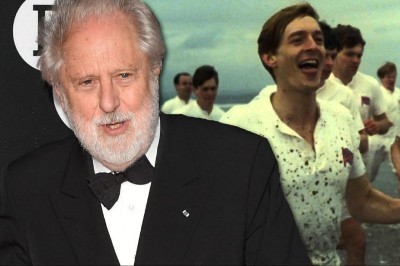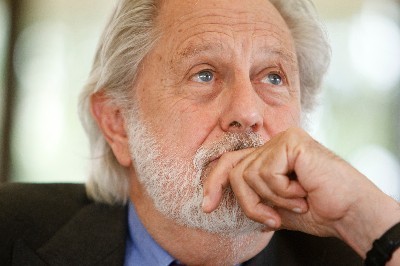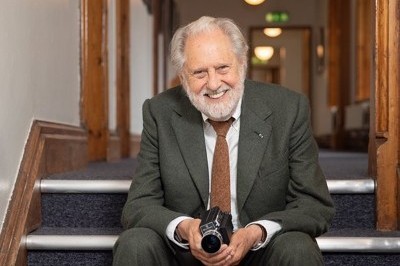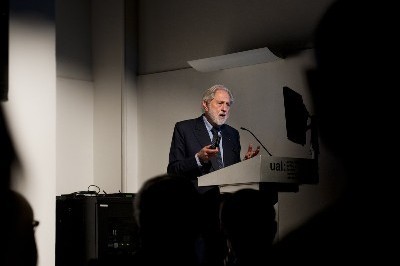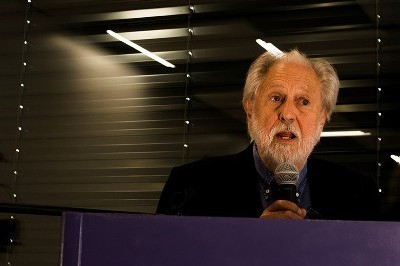Source: Hanna Flint for Yahoo Movies UK, October 23, 2018

Filmmaker Lord David Puttnam says money is stifling creativity in the movie business, and Netflix is partially to blame.
The streaming giant is expected to spend £10 billion on original content in 2018, attracting big names like Ryan Murphy, the Obamas, and David Letterman with huge deals, but Puttnam says this is putting the cart before the horse.
“There is a lot of money sloshing around the industry at the moment and I think it’s become quite incontinent upon entry.,” Puttnam, who won the Best Picture Oscar for Chariots of Fire, tells Yahoo Movies UK.
“I understand exactly why Netflix is doing what they are doing. They’ve got a business model, it works, but the net effect is that you don’t improve people’s career prospects or anything else by doubling their income. That’s not what does it, especially at the top.”
“Talent is literally being bought,” he adds. “I watched that happen in the ’80s and it’s the second time I’ve watched it in my life.”
Puttnam retired from filmmaking in 1998 to focus on his work in education and the environment, and says talent-driven filmmaking was part of the reason he left the industry.
“I suddenly realised I was moving into a “who’s in it?” world not a “what is it?” world. I didn’t want to do that.”
Yahoo Movies UK caught up with the Labour peer to discuss his work with the Mohamed F. Farsi Foundation – set up by film producer and philanthropist Mr Hani Farsi – which launched a scholarship at the Cannes film festival three years ago. It aims to give voice to Middle Eastern, female filmmakers through a fully paid Masters degree course at UCLA (University of California, Los Angeles).
The programme’s goal is to create a global network of female film directors, from multiple underrepresented cultures, and Hanadi Elyan is one female Arab filmmaker to benefit from it.
“Recurring stereotypes we see on TV and movies constantly are the radical, the uneducated and the extreme,” Elyan says. “Knowing that this image is of a tiny minority that represents itself only, out of all the hundreds of million peaceful, hardworking, Arabs or over a billion Muslims, breaking stereotypes has become a personal mission that I attempt to chip at one film at a time.”
As someone who has seen the benefits of representation and equality in the film industry, Puttnam supports Elyan and the MSFF programme entirely.
You can read our Q&A with the legendary producer below.
Yahoo Movies UK: Can you tell us why the MSFF programme is something you wanted to get behind of?
Lord Puttnam: I did seven really happy years as president of UNICEF and I learned that if you want to create permanent advocacy change it’s about the education of women. Women create change, men really don’t. You do not permanentise because when you change women they will never allow their children to slide back.
That’s the first thing, the second thing is that I started seeing Arab movies made by women like [Nadine Labaki’s] Caramel and noticed how good they were. This is a whole voice I’d never heard, so I’ve developed this theory that unless we create voices for people, which allows them to tell their narrative, and view the world from their perspective, we’re never going to learn anything.
Would you also agree that it’s about given these filmmakers access to the same economic opportunities too?
I think that’s the more mechanistic thing. There is a wonderful documentary about Mike Nichols (The Graduate, Closer) and in it, he’s talking about stage and theatre, but also he says what you’re trying to do in film is get the audience to say “hang on, I know her, I am her.” Now once you’ve made that connection in the situation they are dealing with, who they are or who they are falling in love with, whatever it is, once you make that connection you alter and that’s what people haven’t had a chance to do with Arab film – connect.

When was the first time you recognised there was an issue with how male-dominated the film industry is and felt a need to make a change?
The first time I really noticed, because I had pretty much accepted the way it was, but I went to LA in 1975 to make a movie and saw for the first time a woman electrician. I thought that was amazing so then I started asking questions because when I started, a Mitchell camera was unbelievably heavy and any nicely brought up men would not for a moment let [a woman] carry it. So you might want to be the cameraman but it was a physical thing and you’re not going to ask a woman to do that, so consequently, women had the jobs that men felt comfortable around.
Right, but we’re talking more than just physical jobs we’re talking directing, writing and producing which were similarly not readily available careers for women. Were you making moves back then to ensure better opportunities for women in these creative roles?
I would hate to overstate the situation but number one, all the early decisions that I made at Columbia involved one of the very few women directors at the time, a woman called Doris Dörrie, a German director, so I knew consciously that I loved the idea. It was quite a tricky thing to have a woman director do this film for us but more than that though, because I had money and power I created two new directors schemes.
One was deliberately allowing people coming up from film schools to make their first film and that was a strict 50/50 thing – 50 percent had to be women and we imposed it. The other one was that if you were a young editor or cinematographer we’d give you a chance to move into directing. It was a deliberate attempt to move things and again because the guy who was running it for me was great, we strictly based it on the idea that we would look for women. Where we found them early on was in editing and encouraged them to direct.
What’s your lasting memory of being head of Columbia?
My best moment in that whole Columbia experience was at the 1987 Oscars, we did very well we won for The Last Emperor.
I might have been a hopeless failure but we won a lot of Oscars that year! But there was a moment when we won two short film awards and the guy who won collected them and said, at the time I was very unpopular, but he said “none of this would have happened unless David Puttnam had stepped up.”
There was applause, not universal, but there was applause in that hall.
Why weren’t you popular?
I had tried to cut star salaries. I gave myself this job of bringing the average cost of films down from $18 million to as close as I could to $13 million. What I didn’t realise was that agents would go berserk.
What do you think about the film industry now?
I think at the moment there is a lot of money sloshing around the industry at the moment and I think it’s become quite incontinent upon entry.
I understand exactly why Netflix is doing what they are doing. They’ve got a business model, it works, but the net effect is that you don’t improve people’s career prospects or anything else by doubling their income. That’s not what does it, especially at the top.
So what’s happening is talent is literally being bought. I watched that happen in the ’80s and it’s the second time I’ve watched it in my life.
Is that why you left the film industry?
What did it was that I had a really great project and someone said to me, “who’s going to be in it?”
And I said I hadn’t even thought about that and I suddenly realised I was moving into a “who’s in it?” world not a “what is it?” world.
I didn’t want to do that.
There’s a lot of remakes being made in Hollywood right now. Would you be happy if one of the filmmakers like Hanadi Elyan remade it?
They’ve got to make their own Chariots of Fire.
Chariots of Fire is a very personal film to me, nearly all the films I’ve done are. Most of my movies are all about the same thing, they are basically about men with other men, and in conflict, with decisions to make.
But there have been plenty of men making movies about women so why couldn’t a female director make a film about men?
Right, but I was principally concerned with the fact that I’ve got all these monkeys to get off my back and I’m going to use cinema as a way with dealing with them and explaining them to myself.
I did some, essentially, autobiographical films – How I Met My Missus At School, That’ll Be The Day, Stardust – so I was working stuff out about myself and there’s nothing new about that.
Tolstoy argued that you couldn’t be an artist until you had written yourself out so you’ve got to get you out of it and then you can write other stuff.
So once they’ve written themselves they can redo Chariots of Fire?
I wouldn’t mind it at all. I’ve had someone at the moment who has actually approached me about doing a remake of Chariots of Fire. Right now, I have the rights and I told them that if they came up with a great screenplay and a reason to do it then fine, I’m not bothered.
Find out more about the MSFF film scholarship programme here.



